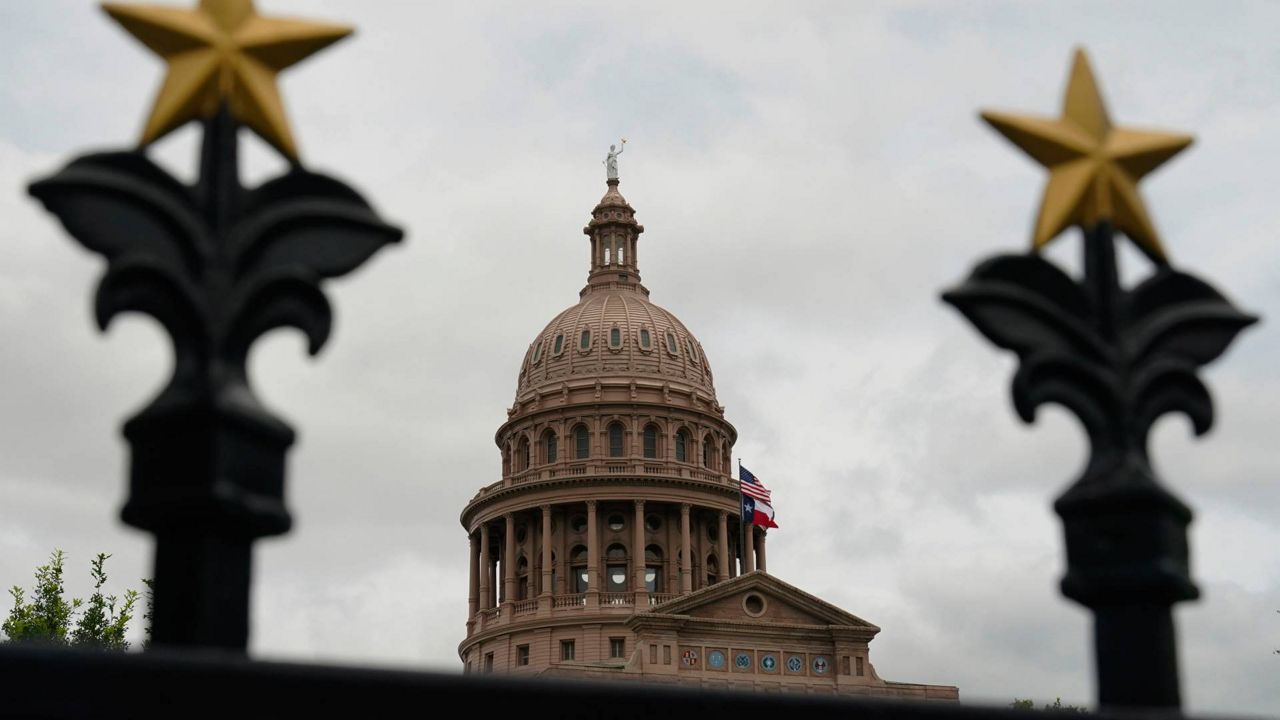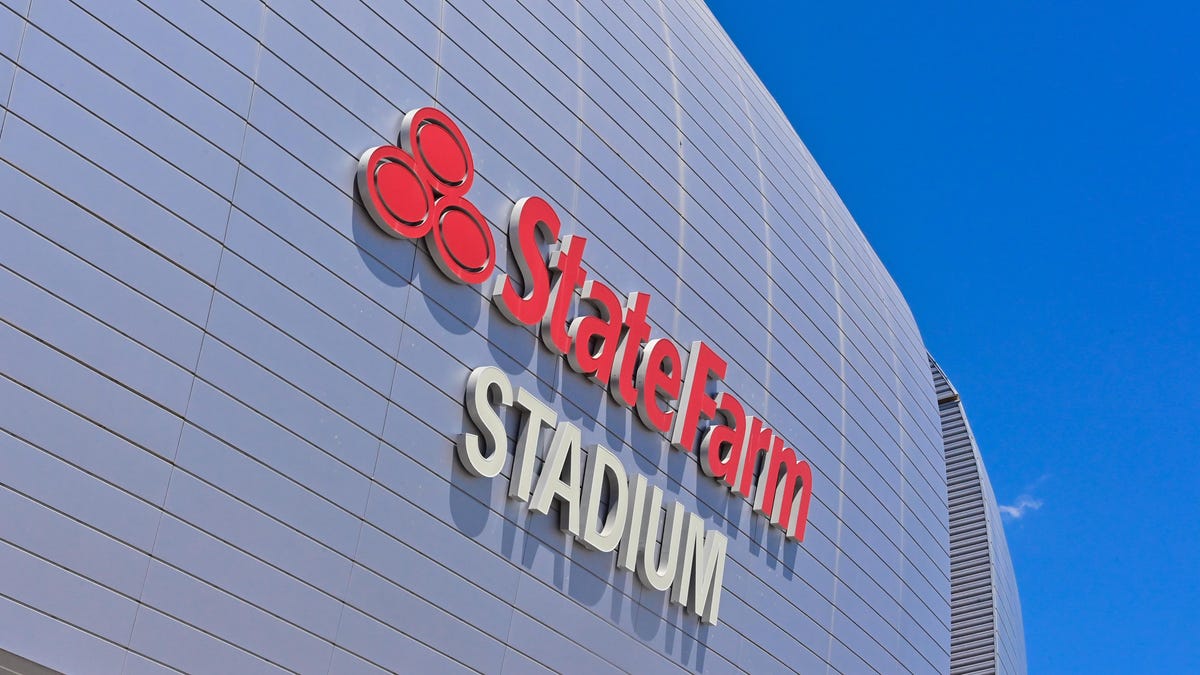World
Sudan’s armed rivals fight on another front, international legitimacy

Abdelrahim Hamdan Dagalo – brother of Sudan’s Rapid Support Forces (RSF) commander Mohamed Hamdan “Hemedti” Dagalo and his deputy – has had his assets frozen in the United States, while Abdul Rahman Juma, an RSF commander in West Darfur, was hit with a visa ban.
With that, the paramilitary force has lost hope of acquiring political legitimacy after the duo were sanctioned on September 6, according to analysts and activists.
Both were sanctioned over human rights abuses, specifically atrocities in Sudan’s West Darfur province. US Secretary of State Antony Blinken said Juma was sanctioned for ordering the June 15 assassination of West Darfur’s Governor Khamis Abdallah Abakar.
“The sanctions really are a blow to the personal brand of the Dagalo family,” said Kholood Kair, a Sudanese expert and founding director of Confluence Advisory.
The importance of legitimacy
In 2019, the RSF started an extensive, and expensive, effort to rehabilitate its image from a violent militia responsible for numerous atrocities in the Darfur region to a benevolent force defending calls for democracy.
A popular uprising had removed Sudan’s former President Omar al-Bashir, and the RSF tried to ride the wave of popular discourse, co-opting human rights activists by paying them top dollar and hiring PR firms to transform its image.
The RSF stepped up its reputation laundering after a civil war erupted between the paramilitary and the army on April 15. But with the sanctions, its effort and money may have gone to waste.
“Abdelrahim and Hemedti have been very conscious about being sanctioned because they know that is the kind of thing that follows you around for the rest of your life,” Jonas Horner, an independent expert on Sudan, told Al Jazeera.
“They’ve always known that legitimacy is very important if they want to be relevant politically.”
Beyond rehabilitation?
In West Darfur, the RSF and allied Arab militias have been accused of committing summary executions, sexual violence and burying corpses in mass graves, according to rights groups, witnesses and the United Nations.
Yet Abdelrahim Dagalo denied the reports during an interview with Sky News Arabia on September 7. He claimed the violence in West Darfur was the result of a “tribal war” fuelled by the army.
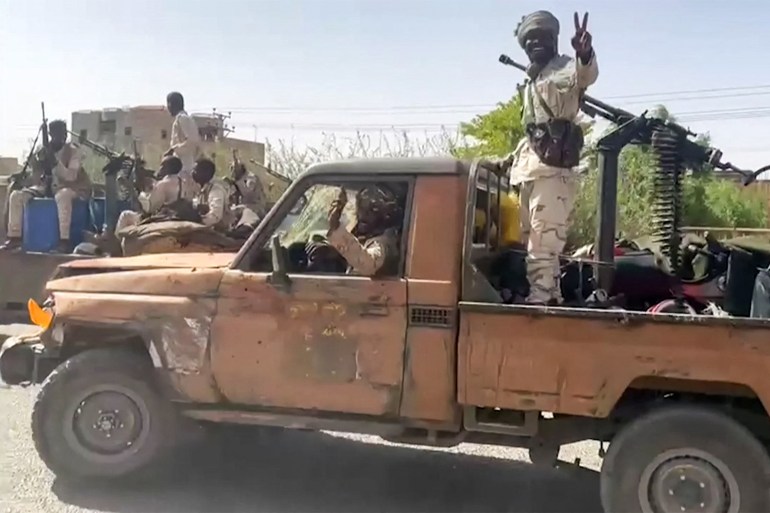
“The military is behind these crimes [in West Darfur] because it gives weapons to the tribes. The army works with the tribes in the evening and allows them to kill each other during the day,” Abdelrahim claimed.
But Mohamad Sharif, a human rights lawyer who fled el-Geneina to Chad in May, said the Arab militias are being armed by the RSF, not the army.
“It’s natural that Abdelrahim Dagalo and the RSF would deny what they did,” he told Al Jazeera over the phone. “But all the witnesses from West Darfur know the crimes against them are the work of the RSF.”
Sharif referenced the assassination of Abakar, who was killed after saying a genocide was taking place in West Darfur during an interview with Saudi channel Al Hadath.
He added that a number of other human rights monitors and dissidents have been killed.
“All these targeted violations are being ordered by the RSF,” he told Al Jazeera.
Equal treatment?
The army has tried to frame the conflict as a war between the state and a rebel militia, rather than a battle between two sides of the security forces, analysts say.
As such, US sanctions against the RSF help the army’s narrative, according to Alan Boswell, an expert on the Horn of Africa for the International Crisis Group, but that does not mean Western diplomats have decided to assign more legitimacy to the army than the RSF.
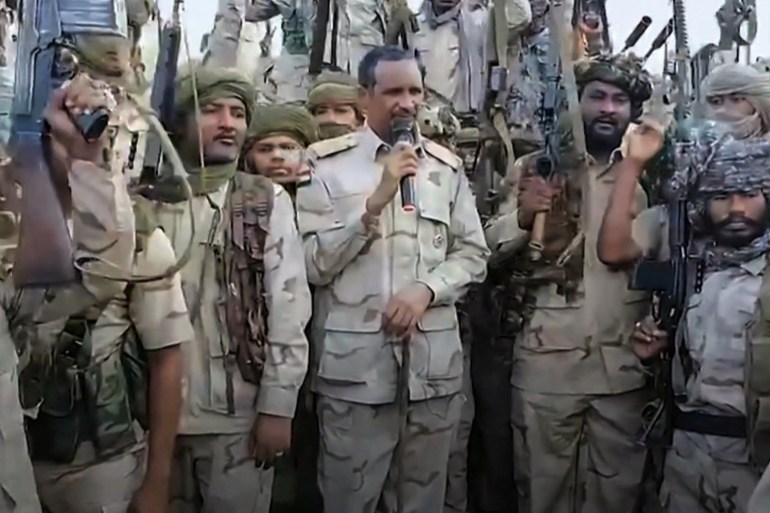
“My understanding is that those debates are unresolved, so I wouldn’t read too much into the sanctions in that regard,” he said.
One Western diplomat, who was not authorised to speak to the media, told Al Jazeera both sides should be disqualified from governing Sudan and a civilian entity should assume power after the conflict. However, the diplomat said: “I am afraid that US realpolitik will kick in and that they will recognise the army as the government of Sudan.”
Confluence Advisory’s Khair said Washington has two main concerns: they don’t want the RSF to defeat the army nor for al-Bashir-era figures to return to prominence.
The latter hail from Sudan’s political Islamic movement and support the army.
“US officials are trying to balance both of these concerns,” she said. “They are worried about the RSF – a militia – establishing a government or parallel government in Sudan and they are worried about Bashir-era Islamists attracting or inviting Sahelian jihadists to the conflict.”
Emboldening the army
Sanctions against the paramilitary could make the army less amenable to peace talks, said Boswell.
“There is definitely a risk that the Sudanese army … may think the tide of global opinion is turning more and more against the RSF and therefore feels emboldened to seek victory on the battlefield,” he said.

In recent days, the army has stepped up indiscriminate attacks in Khartoum.
On Wednesday, the US Department of State expressed concern over the growing number of civilian deaths caused by air attacks.
On September 10, an army air attack hit a market, killing more than 40 civilians and injuring about 70. Activists said a few RSF fighters were there, selling looted items, but that hundreds of civilians were also selling juice and tea to earn a living.
Army spokesman Nabil Abdallah did not respond to questions from Al Jazeera about the incident.
Khair said the army clearly has no qualms about bombing residential targets, ostensibly to hit the slightest possible RSF presence. The difference now, she added, is that the army might believe that they have enough internal and external support to evade repercussions.
“I think the army is feeling very triumphant … and that could fuel their bad behaviour,” she said.

World
Poland says Netanyahu won't be arrested if he attends Auschwitz event

Polish Prime Minister Donald Tusk says Israel’s Benjamin Netanyahu will not be detained despite the International Criminal Court (ICC) arrest warrant.
The Polish government has guaranteed that Israel’s Prime Minister Benjamin Netanyahu will not be arrested if he attends the 80th anniversary of the liberation of the Auschwitz-Birkenau death camp, despite the International Criminal Court (ICC) warrant against him.
Poland’s President Andrzej Duda, from the opposition Law and Justice party (PiS), this week wrote to the government requesting that Netanyahu not be arrested if he decides to attend the Auschwitz commemoration on 27 January, according to a presidential aide.
The office of Prime Minister Donald Tusk published a resolution on Thursday saying it would ensure the “safe participation of the leaders of Israel in the commemorations”.
“I confirm, whether it is the prime minister, the president or the minister — as it is currently declared — of education of Israel, whoever will come to Oswiecim for the celebrations in Auschwitz will be assured of safety and will not be detained,” Tusk said.
Tusk made clear that the resolution was “precise” and only applied to the Auschwitz commemorations.
“It is also very important for us that Poland is not among those countries that openly and demonstratively want to disregard the decisions of international tribunals,” he added.
The ICC issued arrest warrants in November for Netanyahu and his ex-defence minister, as well as a Hamas leader, Ibrahim Al-Masri, for alleged war crimes and crimes against humanity during the 15-month war in Gaza.
Member countries of the ICC, such as Poland, are required to detain suspects facing a warrant if they set foot on their soil, but the court has no way to enforce that. Israel is not a member of the ICC and disputes its jurisdiction.
The court has more than 120 member states, although some countries, including France and Hungary, have already said that they would not arrest him. Hungarian Prime Minister Viktor Orbán even said he would defy the warrant by inviting Netanyahu to Budapest.
It is unclear whether Netanyahu plans to attend the commemoration later this month, although he has been present at previous anniversary events at Auschwitz.
Poland’s Foreign Ministry, in response to an email query, said on Thursday that “it has not received any information so far indicating that Prime Minister Benjamin Netanyahu is going to attend the celebration of the 80th anniversary of the liberation of Auschwitz.”
The commemoration will be attended by international officials and elderly survivors. It is to take place in Oswiecim, a town that was under German occupation during World War II where the Nazi German forces operated the most notorious of their death camps.
More than 1.1 million people were murdered at Auschwitz. Historians say that most of them, about a million, were Jewish, but the victims also included Poles, Roma, Soviet prisoners of war, and others.
At least 3 million of Poland’s 3.2 million Jews were murdered by the Nazis, accounting for about half of the Jews killed in the Holocaust.
Additional sources • AP
World
Monday’s Vikings-Rams NFL Playoff Game Moved to Arizona Due to L.A. Wildfires

ad
World
Details of Venezuelan opposition leader's possible arrest remain unclear amid Maduro inauguration resistance
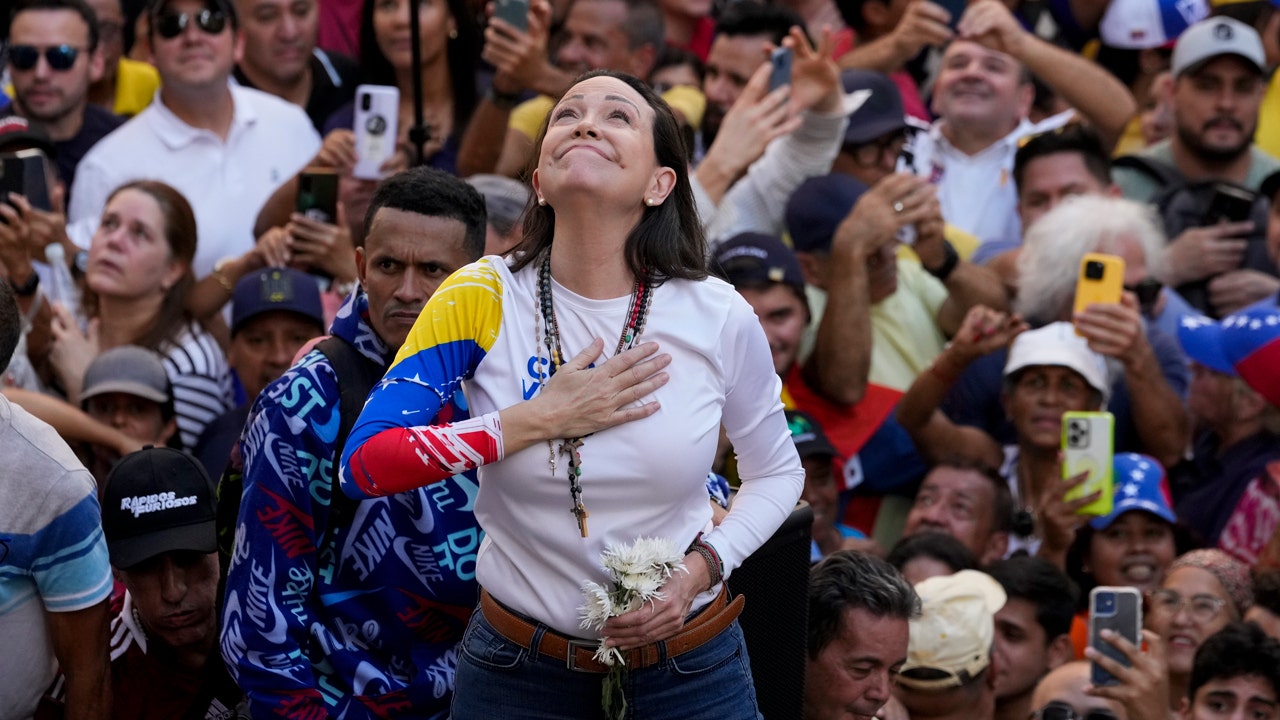
Aides to Venezuela opposition leader Maria Corina Machado said she was detained Thursday, followed moments later by official denials, in a confusing episode that capped a day of protests seeking to block President Nicolás Maduro from clinging to power.
It’s not clear exactly what transpired after Machado bid farewell to hundreds of supporters, hopped on a motorcycle and raced with her security convoy through the empty streets of eastern Caracas to an undisclosed location.
At 3:21 p.m. local time, Machado’s press team said in a social media post that security forces “violently intercepted” her convoy. Her aides later confirmed to The Associated Press that the opposition hardliner had been detained, and international condemnation immediately poured from leaders in Latin America and beyond demanding her release.
But about an hour later, a 20-second video of Machado was posted online by a Maduro supporter in which the opposition leader said she was followed after leaving the rally and that she had dropped her purse. “I’m good, I’m safe,” Machado said in a raspy voice, adding “Venezuela will be free.”
THOUSANDS OF VENEZUELAN OPPOSITION SUPPORTERS TAKE TO THE STREETS AHEAD OF MADURO’S THIRD INAUGURATION
Her aides later said in a social media post that the proof-of-of-life video message had been coerced, and that after recording it she was freed. They said she would provide details of her “kidnapping” later.
Meanwhile, Maduro supporters denied that she was detained and gloated that government opponents were trying to spread fake news to generate an international crisis. “Nobody should be surprised,” Communications Minister Freddy Nanez said. “Especially since it’s coming from the fascists, who were the architects of the dirty trick.”
Earlier Thursday, Machado addressed hundreds of supporters who heeded her call to take to the streets a day before the ruling party-controlled National Assembly was scheduled to swear in Maduro to a third six-year term despite credible evidence that he lost the presidential election.
“They wanted us to fight each other, but Venezuela is united, we are not afraid,” Machado shouted from atop a truck in the capital minutes before she was reported detained.
Machado, 57, is a hardliner former lawmaker who stayed and fought against Maduro even after many of her allies in the opposition leadership fled, joining an exodus of some 7 million Venezuelans who’ve abandoned their homeland in recent years.
Loyalists who control the country’s judiciary banned her from running against Maduro last year. In a deft move, she backed an unknown outsider — retired diplomat Edmundo González — who crushed Maduro by a more than two-to-one margin, according to voting machine records collected by the opposition and validated by international observers.
Venezuelan opposition leader Maria Corina Machado addresses supporters at a protest against President Nicolas Maduro in Caracas, Venezuela, Thursday, Jan. 9, 2025, the day before his inauguration for a third term. (AP Photo/Ariana Cubillos)
González, invoking the title of president-elect recognized by the U.S. and other countries, was among those who demanded Machado’s release in the immediate aftermath of what was believed to be her shock arrest.
“To the security forces, I warn you: don’t play with fire,” he said in a social media post from the Dominican Republic, where he met with President Luis Abinader and a delegation of former presidents from across Latin America.
There was a relatively small turnout for Thursday’s protests as riot police were deployed in force. Venezuelans who’ve witnessed Maduro’s security forces round up scores of opponents and regular bystanders since the July election were reluctant to mobilize in the same numbers as they have in the past.
“Of course, there’s fewer people,” said empanada vendor Miguel Contrera as National Guard soldiers carrying riot shields buzzed by on motorcycles. “There’s fear.”
Those demonstrators that did show up blocked a main avenue in one opposition stronghold. Many were senior citizens and dressed in red, yellow and blue, answering Machado’s call to wear the colors of the Venezuelan flag. All repudiated Maduro and said they would recognize González as Venezuela’s legitimate president.
The deployment of security forces as well as pro-government armed groups known as “colectivos” to intimidate opponents betrays a deep insecurity on the part of Maduro, said Javier Corrales, a Latin America expert at Amherst College.
Since the elections, the government has arrested more than 2,000 people — including as many as 10 Americans and other foreigners — who it claims have been plotting to oust Maduro and sow chaos in the oil rich South American nation. This week alone, masked gunmen arrested a former presidential candidate, a prominent free speech activist and even González’s son-in-law as he was taking his young children to school.
“It’s an impressive show of force but it’s also a sign of weakness,” said Corrales, who co-authored this month an article, “How Maduro Stole Venezuela’s Vote,” in the Journal of Democracy.
“Maduro is safe in office,” said Corrales, “but he and his allies recognize they are moving forward with a big lie and have no other way to justify what they are doing except by relying on the military.”
Venezuela’s National Electoral Council, also stacked with government loyalists, declared Maduro the winner of the election. But unlike in previous contests, authorities did not provide any access to voting records or precinct-level results.
The opposition, however, collected tally sheets from 85% of electronic voting machines and posted them online. They showed that its candidate, González, had thrashed Maduro by a more than two-to-one margin. Experts from the United Nations and the Atlanta-based Carter Center, both invited by Maduro’s government to observe the election, have said the tally sheets published by the opposition are legitimate.
The U.S. and other governments have also recognized González as Venezuela’s president-elect. Even many of Maduro’s former leftist allies in Latin America plan to skip Friday’s swearing-in ceremony.
President Joe Biden, meeting González at the White House this week, praised the previously unknown retired diplomat for having “inspired millions.”
“The people of Venezuela deserve a peaceful transfer of power to the true winner of their presidential election,” Biden said following the meeting.
-

 Business1 week ago
Business1 week agoThese are the top 7 issues facing the struggling restaurant industry in 2025
-

 Culture1 week ago
Culture1 week agoThe 25 worst losses in college football history, including Baylor’s 2024 entry at Colorado
-

 Sports1 week ago
Sports1 week agoThe top out-of-contract players available as free transfers: Kimmich, De Bruyne, Van Dijk…
-

 Politics1 week ago
Politics1 week agoNew Orleans attacker had 'remote detonator' for explosives in French Quarter, Biden says
-

 Politics1 week ago
Politics1 week agoCarter's judicial picks reshaped the federal bench across the country
-

 Politics6 days ago
Politics6 days agoWho Are the Recipients of the Presidential Medal of Freedom?
-

 Health5 days ago
Health5 days agoOzempic ‘microdosing’ is the new weight-loss trend: Should you try it?
-

 World1 week ago
World1 week agoIvory Coast says French troops to leave country after decades




